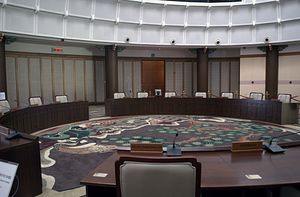When leaders from the 21 member states of the Asia-Pacific Economic Cooperation forum meet for the group’s annual summit in Manila later this year, they should finally consider India’s request for membership, according to the recommendations of a policy task force led by former Australian Prime Minister Kevin Rudd and the Asia Society Policy Institute (ASPI). Rudd, along with Ajay Banga, chief executive officer of Mastercard and another member of the high-level task force, wrote in favor of India’s accession to APEC in the Wall Street Journal earlier this year as well.
New Delhi has sought to join the group to no avail for more than twenty years. In recent years, India has slowly started to gain the support of the United States for its bid to become more involved in APEC. In 2011, the United States invited India to participate in APEC as an observer (the forum met in Hawaii that year). Indian Prime Minister Narendra Modi raised the issue of Indian membership in APEC when he met U.S. President Barack Obama in January, when the U.S. president visited New Delhi as the guest of honor for India’s Republic Day parade, and Obama expressed support for India’s membership in the organization. In addition to the United States, Russia and China have also welcomed India’s participation in APEC.
India has long sought membership in the APEC forum, for strategic, diplomatic, and economic reasons. With 21 members from both sides the Pacific ocean and an influential annual leaders’ meeting, APEC serves a valuable role in the Asian diplomatic scene. Though New Delhi’s ambition for APEC membership hasn’t come to fruition to date, it won a small victory when, the U.S. invited it to observe in 2011. Though most APEC member states do not deny India’s growing economic clout on the world stage, the mere geographic reality that India doesn’t sit on the Pacific Ocean has led the grouping to see New Delhi’s participation as antithetical to the geographic logic of the organization.
Beyond geography, the question of India’s membership hadn’t come up seriously for some time due to a moratorium on APEC membership that was established in 1997 for a ten year period and extended again in 2007 for an additional three years. Since 2010, with no moratorium currently in place, some APEC members have expressed concerns that India’s inclusion could offset the “balance” of the grouping away from its Pacific Rim focused given India’s clout. Beyond the balance issue, opponents of India’s accession to the group cite New Delhi’s tendency to drive a hard bargain in trade negotiations (at the Doha round of the WTO, for instance). As APEC is a non-binding gathering of like-minded economies, there are concerns that New Delhi may not be adequately “like-minded” on the issue of free and freer trade than the current APEC membership. The Modi government, given its greater acceptance of regulatory liberalization than the center-left United Progressive Alliance government that preceded it, has assuaged these concerns to an extent.
Unlike regulatory intergovernmental organizations like the World Trade Organization (WTO), APEC is not a forum for member states to negotiate market access, tariffs, or anything of the sort. Similarly, APEC is not a framework around which future free trade regimes are set to be organized, even if current initiatives like the Trans-Pacific Partnership have a similar geographic ambit. APEC’s mission statement describes the organization as an “economic forum” which has the goal of supporting “sustainable economic growth and prosperity in the Asia-Pacific region.”
For India, which in the early 1990s began pursuing a “Look-East” policy as it simultaneously liberalized its own economy, participation in APEC is seen as a way to bolster New Delhi’s economic integration with East Asian and Pacific Rim economies. Last year, India’s new government cast the “Look East” policy as an “Act East” policy, suggesting that it would pursue India’s ties with Pacific Rim states with additional vigor. Former Indian Foreign Secretary Shyam Saran notes that “APEC is the missing link in India’s Act East policy because we are already heavily engaged with APEC countries.”
For current APEC members and regional investors, India’s inclusion in APEC is largely seen as a positive development as it could lead help open India’s economy up even further. Rudd, at the inauguration of the ASPI task force, has noted that “including India in APEC, which for more than 25 years has spearheaded trade and investment liberalization efforts across the Asia-Pacific region, will help open India’s economy to the region and the world, to the benefit of India and its neighbors and trading partners.”
It’s unclear if 2015 will finally be the year when APEC will take action on India’s accession to the grouping despite widespread support for the idea. Apart from statements in favor of India’s accession at bilateral meetings with senior Indian officials and independent recommendations, like that of the ASPI task force, India’s membership bid has repeatedly failed to gain real momentum. Based on the priorities set out for the 2015 APEC Summit, membership expansion to include India doesn’t seem like a real possibility yet again.

































